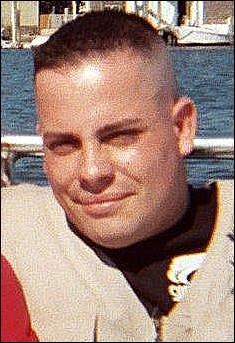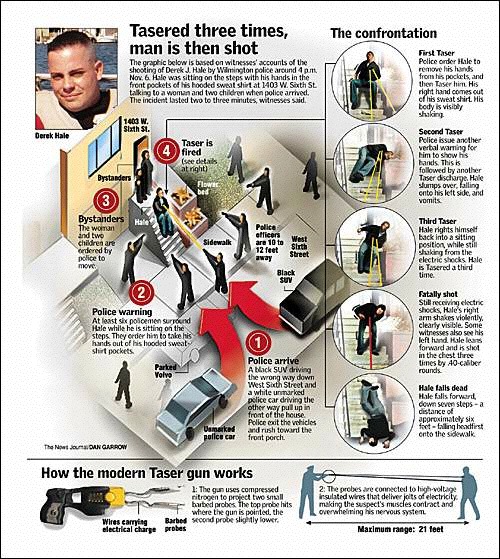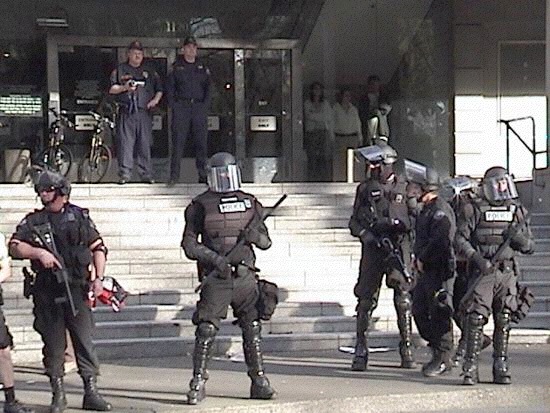The Association to Free Mark Kirk offers condolences to the Hale family
and strongly supports their lawsuit against the Wilmington police.
Two articles follow:
1) Federal civil rights lawsuit filed in death of Pagan Derek Hale from the News Journal March 23, 2007
2) Death Squad in Delaware: The Case of the Murdered Marine by Will Grigg March 29, 2007
=======================================================================




Fed. civil rights lawsuit filed in death of Pagan Derek Hale
By LEE WILLIAMS, The News Journal
Updated Friday, March 23, 2007 at 2:05 pm
The widow and parents of Derek Hale – who was killed by police more than four months ago – filed a federal civil rights lawsuit today against Wilmington police officers and state troopers, alleging they used excessive force and violated department policy and state law when they shot the 25-year-old Virginia man with three blasts from a Taser, followed by three .40-caliber rounds to his chest.
Hale, a decorated Marine and member of the Pagans Motorcycle Club, was killed Nov. 6, 2006, while sitting on the steps outside a home on West Sixth Street in Wilmington.
In the wrongful-death lawsuit, Wilmington attorney Thomas Neuberger names Wilmington Police Lt. William Browne as the officer who killed Hale. Browne did not respond to e-mails or phone calls seeking comment. An interview request was rejected by his department.
Browne is a named defendant in the suit, along with Wilmington Police Chief Michael Szczerba, Delaware State Police Superintendent Col. Thomas F. MacLeish and other law enforcement officials, including yet-unidentified “John Doe” police officers and “Richard Roe” state troopers.
In November 2006, the Delaware State Police concluded an 18-month narcotics investigation which led to the arrests of 12 people – including some members of the Pagans’ Delaware chapter – for drug and weapons offenses. Authorities searched Pagans’ homes and seized personal property in a series of raids.
Hale, a “person of interest” in the investigation, was Tasered and shot to death by police who said they feared for their safety after confronting him at the home of another Pagan because Hale refused to remove his hands from the front pockets of a hooded sweat shirt.
Several witnesses said Hale never threatened the officers.
Neuberger said Hale was physically unable to comply with the officers’ commands to show his hands because the three electric Taser strikes made it impossible for him to move.
The lawsuit seeks unspecified compensatory and punitive damages awards for Elaine Hale, Hale’s widow, and Dennis and Connie Hale, his parents, as well as written apologies for his killing and a mandatory injunction forcing the Wilmington Police Department and Delaware State Police to “properly train their officers in the use of Tasers and deadly force.”
Neuberger filed the suit assisted by the Washington D.C.-based law firm of Arnold & Porter and the Rutherford Institute, a human rights and civil liberties organization in Virginia.
“In court we will clear Derek’s good name and restore his reputation,” Neuberger said. “We will ask a civil jury to hold each person involved responsible for their role in his tragic death, in what in police parlance is known as a ‘bad shoot,’ that is, an unjustified killing that violated Derek’s right to life and liberty under the Constitution which he fought overseas to defend while serving two tours in Iraq during Operation Enduring Freedom.”
Hale, who had no arrest record in Delaware, was killed during what Neuberger called “a misdirected Delaware State Police tactical operation.”
The suit charges that no crime was in progress at the time of the killing, and Hale, who was unarmed, posed no threat to the officers or anyone at the scene. Police have said Hale was in possession of a switchblade knife and a can of pepper spray, but was not brandishing either.
“To the contrary, at the time of the shooting, excessive tasering allegedly had left Hale virtually paralyzed, unable to comply with the police officers’ demands, and in no way capable of harming the at least eight, specially trained and heavily-armed troopers and officers who had surrounded him,” Neuberger said.
The lawsuit charges that leadership failures at the highest levels of the Delaware State Police, including MacLeish, contributed to Hale’s death.
Hale’s killing is still being investigated by Wilmington police and the Delaware Attorney General's Office.
Jason Miller, spokesman for Attorney General Joseph R. “Beau” Biden, said Thursday the investigation remains ongoing.
“We will share our report, the facts of the case as established, and the conclusions,” Miller promised.
He could not explain why the investigation has taken more than four months.
“ I can’t comment on that,” he said. “I can only say it’s still being worked on. We know there is public interest in this case.”
Wiretaps
Hale joined the Marine Corps in 2001 and served for five years, including two tours of duty in Iraq, before he was honorably discharged last year with a service-related disability.
He joined the Virginia branch of the Pagan Motorcycle Club after leaving the military. More than 50 percent of the club’s members are veterans, say club officials.
“There, he found the sense of brotherhood, camaraderie and espirit de corps that he had been missing, and was able to ride his motorcycle in a relaxed atmosphere,” the complaint states.
The Delaware State Police says the Pagans are an outlaw motorcycle gang. Over the years, the Delaware Pagans members have been arrested for crimes of drugs and violence. The club has also sponsored several Toys for Tots runs.
On Nov. 3, 2006, Hale traveled to Delaware to take part in one of the charity events.
Following the toy run, on Nov. 6, 2006, Hale was house-sitting for a Delaware club member who had been arrested, and had his home searched, as part of an investigation into the Pagans by the Delaware State Police.
According to a written statement by state police, Hale was seen the day he was killed moving items from inside the house to a vehicle and officers “had reason to believe he was preparing to flee.”
Neuberger’s complaint says that’s not true.
“As part of its probe, the DSP fully and exhaustively investigated the background of each and every person who associated with the Delaware Club,” the complaint states. “It was falsely claimed that after the arrest warrant for Derek was issued he fled and he ‘was not immediately apprehended.’ It then was falsely stated that on November 6th the DSP sought to ‘arrest Hale on drug charges’ and he then was killed.”
In the hours before Hale’s death, Neuberger alleges, police had the West Sixth Street home under surveillance, and the phone tapped, so they should have known Hale was not a threat, and that he was not preparing to flee.
Surveillance
On the afternoon he was killed, Hale was joined at the home by Sandra Lopez and her two children, ages 11 and 6.
Lopez had joint custody of the children after divorcing the homeowner, Raul Morales, 34, who was charged with drugs and weapons offenses in the Pagans’ case.
When she found out Morales was in custody, she asked Hale to help her move some of her son’s belongings into her car.
While they were doing so, the family dogs escaped, and Hale ran up and down the street trying to corral the pets, the complaint states.
After loading her car, Lopez and Hale sat on the steps talking.
At the same time, a construction crew, Fred Mixson and his brother Harold, arrived next door while a Delaware State Police surveillance team watched activities outside the home.
According to the complaint, the surveillance team observed:
• Lopez’s arrival at the house, and the presence of her two young children who were playing on the front steps.
• Hale chasing the escaped dogs down the street, “and that due to the nature of his clothing it was unlikely that he possessed a weapon in his sweatshirt pocket.”
• Hale and Lopez talking and playing with the young children. • Hale did not act in a threatening or suspicious manner. • Hale did not display a weapon. The complaint states that the surveillance team radioed their observations to an assault team of Wilmington cops and state troopers gathering nearby.
The Killing
Mixson told The News Journal he parked across the narrow street from the home and was standing by the driver's door of his work van when a black SUV sped up, going the wrong way on the one-way street, and screeched to a halt in the middle of the road.
Several police officers jumped out and ran to where Hale was sitting on steep steps, approximately six feet higher than the sidewalk. Mixson and his crew also said Hale was chatting with Lopez and two children at the top of a 10-step concrete stoop.
Hale was seated on the third step from the top. Mixson and another witness were standing across the street, while other construction workers were on the sidewalk in front of a row house adjacent to the site of the shooting.
The officers ordered Hale to take his hands out of the front pockets of his hooded sweat shirt.
“About a second later, they Tasered him,” Mixson has said. “He was just sitting there. He didn't do anything.”
The witnesses told The News Journal Hale shook violently from the charges, as if sitting on an electric chair. His right hand came out of the front of his sweat shirt and was shaking violently.
Seconds later, police repeated their command for Hale to show them his hands, and they Tasered him a second time, after which he rolled onto his left side and vomited into a flower bed, the Mixsons said.
Hale rolled back to his right, into a sitting position, still shaking, and police Tasered him a third time, Mixson said.
Both Mixsons said Hale never threatened officers and “didn’t deserve to be shot.”
According to the complaint, none of the officers: Identified themselves as police or law enforcement officers, as is required by their policy; wore badges; wore police uniforms; had ‘POLICE’ written on the front of their uniforms; or told Hale why they were there, or that they wanted to arrest him.
Neuberger cites Wilmington Police policy that limits the use of Tasers to combative, physically aggressive or actively resisting individuals, and strictly forbids any use outside of these limited circumstances.
“As the electrical current rushed through him, his muscles locked up and he began to shake and convulse uncontrollably.” the complaint states. “After this first tasering, several of the heavily armed police officers were close enough to and had the ability to tackle the completely-incapacitated Hale, but they deliberately chose not to do so.”
According to the complaint, Hale twice shouted, “I’m trying to get my hands out.”
Lopez said she heard Hale shout this, and that she yelled, “He is trying to get his hands out. He cannot get his hands out!”
“Lt. William Browne of the WPD then fired three shots into Hale’s chest, which eventually killed him,” the complaint states. “Lt. Browne failed to exhaust all other reasonable means of apprehension before using deadly force.”
Copyright ©2007, The News Journal. Use of this site signifies your agreement to the Terms of Service and Privacy Policy (updated August...)
=======================================
Death Squad in Delaware: The Case of the Murdered Marine
by William Norman Grigg
by William Norman Grigg

| | He survived Iraq, only to suffer Death By Government in the "Land of the Free": Sgt. Derek J. Hale, USMC, ret. ~ RIP |
| | |
Delaware was the first state to ratify the U.S. Constitution. It may be the first state to be afflicted with a fully operational death squad – unless a civil lawsuit filed on Friday against the murders of Derek J. Hale results in criminal charges and a complete lustration (in the Eastern European sense of the term) of Delaware's law enforcement establishment.
Hale, a retired Marine Sergeant who served two tours in Iraq and was decorated before his combat-related medical discharge in January 2006, was murdered by a heavily armed 8–12-member undercover police team in Wilmington, Delaware last November 6. He had come to Wilmington from his home in Manassas, Virginia to participate in a Toys for Tots event.
Derek was house-sitting for a friend on the day he was murdered. Sandra Lopez, the ex-wife of Derek's friend, arrived with an 11-year-old son and a 6-year-old daughter just shortly before the police showed up. After helping Sandra and her children remove some of their personal belongings, Derek was sitting placidly on the front step, clad in jeans and a hooded sweatshirt, when an unmarked police car and a blacked-out SUV arrived and disgorged their murderous cargo.
Unknown to Derek, he had been under police surveillance as part of a ginned-up investigation into the Pagan Motorcycle Club, which he had joined several months before; the Pagans sponsored the “Toys for Tots Run” that had brought Derek to Delaware. As with any biker club, the Pagans probably included some disreputable people in their ranks. Derek was emphatically not one of them.
In addition to his honorable military service (albeit in a consummately dishonorable war), Derek's personal background was antiseptically clean. He had a concealed carry permit in Virginia, which would not have been issued to him if he'd been convicted of a felony, a narcotics or domestic violence charge, or had any record of substance abuse or mental illness.
On the day he was killed, Derek had been under both physical and electronic (and, according to the civil complaint, illegal) surveillance. Police personnel who observed him knew that his behavior was completely innocuous. And despite the fact that he had done nothing to warrant such treatment, he was considered an “un-indicted co-conspirator” in a purported narcotics ring run by the Pagans.
The police vehicles screeched to a halt in front of the house shortly after 4:00 p.m. They ordered Lopez and her children away from Derek – who, predictably, had risen to his feet by this time – and then ordered him to remove his hands from his the pockets of his sweatshirt.

Less than a second later – according to several eyewitnesses at the scene – Derek was hit with a taser blast that knocked him sideways and sent him into convulsions. His right hand involuntarily shot out of its pocket, clenching spasmodically.
“Not in front of the kids,” Derek gasped, as he tried to force his body to cooperate. “Get the kids out of here.”
The officers continued to order Derek to put up his hands; he was physically unable to comply.
So they tased him again. This time he was driven to his side and vomited into a nearby flower bed.
Howard Mixon, a contractor who had been working nearby, couldn't abide the spectacle.
“That's not necessary!” he bellowed at the assailants. “That's overkill! That's overkill!”
At this point, one of the heroes in blue (or, in this case, black) swaggered over to Mixon and snarled, “I'll f*****g show you overkill!” Having heroically shut up an unarmed civilian, the officer turned his attention back to Derek – who was being tased yet again.
“I'm trying to get my hands out,” Derek exclaimed, desperately trying to make his tortured and traumatized body obey his will. Horrified, his friend Sandra screamed at the officers: “He is trying to get his hands out, he cannot get his hands out!”
Having established that Derek – an innocent man who had survived two tours of duty in Iraq – was defenseless, one of Wilmington's Finest closed in for the kill.
Lt. William Brown of the Wilmington Police Department, who was close enough to seize and handcuff the helpless victim, instead shot him in the chest at point-blank range, tearing apart his vitals with three .40-caliber rounds. He did this after Derek had said, repeatedly and explicitly, that he was trying to cooperate. He did this despite the fact that witnesses on the scene had confirmed that Derek was trying to cooperate. He did this in front of a traumatized mother and two horrified children.
Why was this done?
According to Sgt. Steven Elliot of the WPD, Brown slaughtered Derek Hale because he “feared for the safety of his fellow officers and believed that the suspect was in a position to pose an imminent threat.” That subjective belief was sufficient justification to use “deadly force,” according to Sgt. Elliot.
The “position” Derek was in, remember, was that of wallowing helplessly in his own vomit, trying to overcome the cumulative effects of three completely unjustified Taser attacks.
When asked by the Wilmington News Journal last week if Hale had ever threatened the officers – remember, there were at least 8 and as many as 12 of them – Elliot replied: “In a sense, [he threatened the officers] when he did not comply with their commands.”
He wasn't given a chance to comply: He was hit with the first Taser strike less than a second after he was commanded to remove his hands from his pockets, and then two more in rapid succession. The killing took roughly three minutes.
As is always the case when agents of the State murder an innocent person, the WPD immediately went into cover-up mode. The initial account of the police murder claimed that Derek had “struggled with undercover Wilmington vice officers”; that “struggle,” of course, referred to Derek's involuntary reaction to multiple, unjustified Taser strikes.
The account likewise mentioned that police recovered “two items that were considered weapons” from Derek's body. Neither was a firearm. One was a container of pepper spray. The other was a switchblade knife. Both were most likely planted on the murder victim: The police on the scene had pepper spray, and Derek's stepbrother, Missouri resident Jason Singleton, insists that Derek never carried a switchblade.
“The last time I saw Derek,” Jason told the News Journal, “he had a small Swiss Army knife. I've never seen Derek with anything like a switchblade.”
Within hours, the WPD began to fabricate a back-story to justify Derek's murder. Several Delware State Police officers – identified in the suit (.pdf) as “Lt. [Patrick] Ogden, Sgt. Randall Hunt, and other individual DSP [personnel]” contacted the police in Masassas, Virginia and informed him that Derek had been charged with drug trafficking two days before he was murdered. This was untrue. But because it was said by someone invested with the majestic power of the State, it was accepted as true, and cited in a sworn affidavit to secure a warrant to search Derek's home.
Conducting this spurious search – which was, remember, play-acting in the service of a cover story – meant shoving aside Derek's grieving widow, Elaine, and her two shattered children, who had just lost their stepfather. Nothing of material consequence was found, but a useful bit of embroidery was added to the cover story.
Less than two weeks earlier, Derek and Elaine had celebrated their first anniversary.
The Delaware State Police officer is guilty of misprision of perjury, as are the officials who collaborated in this deception. And it's entirely likely that the Virginia State Police had guilty knowledge as well.
Last November 21, in an attempt to pre-empt public outrage, the highest officials of the Delaware State Police issued a press release in conjunction with their counterparts from Virginia. The statement is a work of unalloyed mendacity.
“Hale resisted arrest and was shot and killed by Wilmington Police on November 6, 2006,” lied the signatories with reference to the claim that he "resisted." “Hale was at the center of a long term narcotics trafficking investigation which is still ongoing.”
As we've seen, Hale did not resist arrest, as everyone on the scene knew. And he was not at the “center” of any investigation; before his posthumous promotion to “un-indicted co-conspirator,” he was merely a “person of interest” because of his affiliation with a motorcycle club.
Most critically, the statement – which bears the august imprimatur of both the Delaware and Virginia State Police departments, remember – asserts: “Both [State Police] Superintendents have confirmed that there was never any false information exchanged by either agency in the investigation of Derek J. Hale, or transmitted between the agencies in order to obtain the search warrant.”
This was another lie.
“Delaware State Police spokesperson Sgt. Melissa Zebley conceded last week that no arrest warrant for Hale was ever issued,” reported the News Journal on March 22. Three days after Hale was murdered, police arrested 12 members of the Pagans Motorcycle Club on various drug and weapons charges, but identified Hale at that point only as a “person of interest.”
Last Friday (May 23), the Rutherford Institute – one of the precious few nominally conservative activist groups that gives half a damn about individual liberty – and a private law firm in Virginia filed a civil rights lawsuit against several Delaware law enforcement and political officials on behalf of Derek's widow and parents. They really should consider including key officials from the Virginia State Police in the suit, as well.
Those who persist in fetishizing local police – who are, at this point, merely local franchises of a unitary, militarized, Homeland Security apparatus – should ponder this atrocity long and hard.
They should contemplate not only the inexplicable eagerness of Lt. William Brown to kill a helpless, paralyzed pseudo-suspect, but also the practiced ease with which the police establishments of two states collaborated in confecting a fiction to cover up that crime.
According to the lawsuit, Lt. Brown, Derek's murderer, “has violated the constitutional rights of others in the past through the improper use of deadly force and has coached other WPD officers on how to lie about and/or justify the improper use of deadly force.” Rather than being cashiered, Brown was promoted – just as one would expect of any other dishonest, cowardly thug in the service of any other Third World death squad.
Derek J. Hale survived two tours of duty in Iraq, a country teeming with Pentagon-trained death squads, only to be murdered by their home-grown equivalent.
March 29, 2007
William Norman Grigg [send him mail] writes the Pro Libertate blog.
Copyright © 2007 William Norman Grigg
![]()

